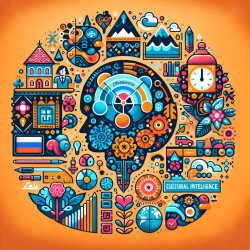In an increasingly globalized world, cultural intelligence (CQ) is a vital skill for professionals working in diverse environments. Defined as an individual's capability to function effectively in culturally diverse settings, CQ encompasses four dimensions: cognitive, metacognitive, motivational, and behavioral. The Cultural Intelligence Scale (CQS) is a tool designed to measure these dimensions. However, its effectiveness can vary across different cultural contexts. A recent study titled "Cross-Cultural Adaptation of Research Tools: A Study on the Cultural Intelligence Scale Adaptation in Slovenian" provides valuable insights into adapting this tool for use in Slovenia.
The Importance of Adapting Research Tools
The adaptation of research tools like the CQS is crucial to ensure their validity and reliability across different cultures. While some researchers argue that such tools can be universally applied, others caution against this assumption due to cultural differences in norms and values. This study highlights the importance of tailoring the CQS to fit the specific cultural context of Slovenia, thereby enhancing its effectiveness.
Key Findings from the Slovenian Study
The study involved focus groups from two Slovenian regions: Ljubljana, a highly intercultural urban center, and Koper, a rural area with less cultural diversity. Participants provided feedback on the CQS items, revealing several areas for improvement:
- Simplification of Language: Participants found some items complex and suggested simplifying them for better comprehension.
- Consistency in Terminology: Inconsistencies in phrases like "different cultural backgrounds" versus "other cultural backgrounds" were noted. Consistent terminology would reduce confusion.
- Cultural Relevance: Items should reflect cultural realities familiar to Slovenians. For instance, replacing "marriage systems" with "marriage customs" aligns better with local understanding.
- Motivational Dimension: The willingness to adapt to other cultures was seen as foundational. Participants emphasized that without motivation, other CQ dimensions are less impactful.
Implications for Practitioners
Practitioners can enhance their intercultural skills by considering these findings when using or developing research tools like the CQS:
- Conduct Cultural Assessments: Before implementing a tool like the CQS in a new context, assess its cultural relevance and make necessary adaptations.
- Engage with Local Experts: Collaborate with local researchers or practitioners who understand the cultural nuances of the target population.
- Encourage Feedback: Collect feedback from participants to identify areas for improvement and ensure the tool's effectiveness.
- Pursue Further Research: Use insights from studies like this one to conduct further research on cross-cultural adaptation and its impact on CQ development.
The Path Forward
This study underscores the importance of adapting research tools to fit specific cultural contexts. By doing so, practitioners can enhance their ability to work effectively in diverse environments. As globalization continues to bring cultures closer together, developing robust intercultural skills will become increasingly essential.
To read the original research paper, please follow this link: Cross-Cultural Adaptation of Research Tools: A Study on the Cultural Intelligence Scale Adaptation in Slovenian.










